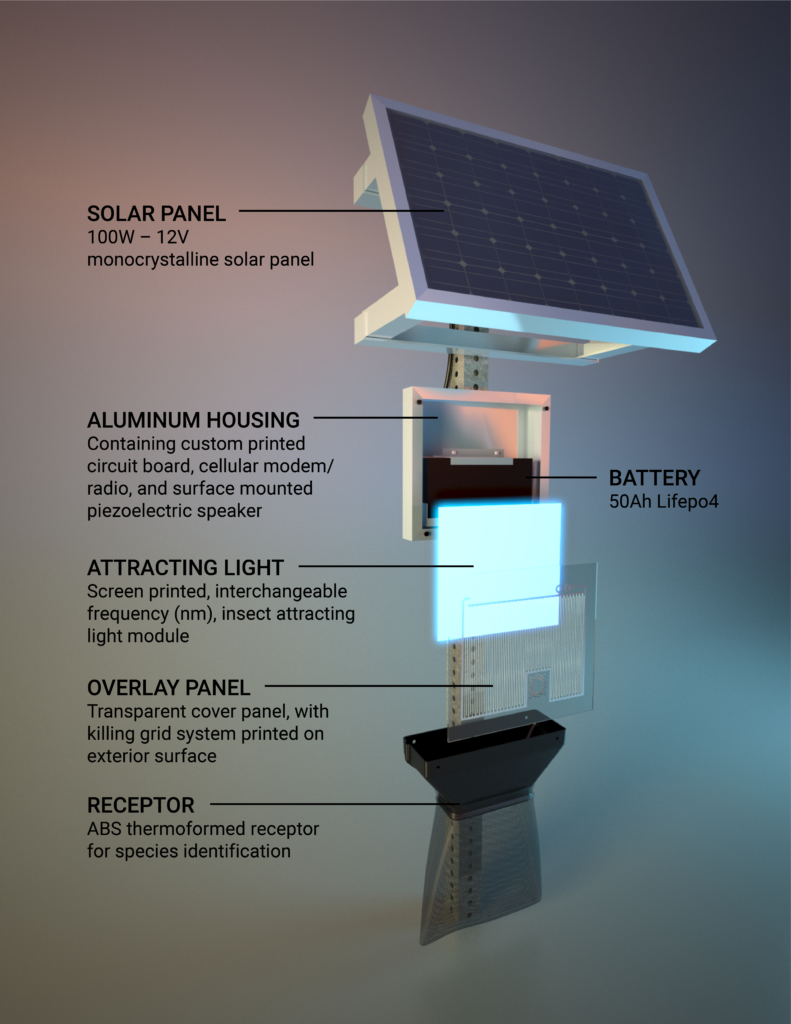Clinton-based agtech company SolaRid AR has received a $181,500 grant through the U.S. Department of Agriculture’s Small Business Innovation Research program to empirically measure its AI-based insect monitoring system’s efficacy and prepare for its launch in commercial agriculture.
The USDA grant marks SolaRid’s second SBIR award in as many years.
In 2020, SolaRid received a $225,000 grant through the National Science Foundation’s SBIR program to develop technology that automatically counts and identifies insect populations, processes this data in real time, and sends that information to handheld devices.
Smart Agriculture
Each year, agricultural pests destroy over 30 percent of crops produced in the United States and cause in excess of $45 billion in damages. In response to this persistent threat, farmers use $25 billion of pesticides, which carry a less visible price tag of over $10 billion in environmental and public health damages.
Current insect monitoring methods lack precision, fail to fully control pests, and fuel pesticide waste.
SolaRid’s innovative solution, an artificial intelligence (AI) technology designed to identify insect populations, will allow farmers to respond to pests more efficiently, reducing environmental harm and raising crop yield.
The technology “will replace an industry of disposable monitoring products used to identify species and sex of insects with a single device,” said Don Richardson, managing member of SolaRid AR and project principal investigator.

Richardson explained that the technology “quantifies the size of insect populations to determine optimum timing of responses,” helping farmers use mitigation methods more effectively and eliminating extra expenses and labor caused by disposable insect monitoring products.
By identifying and targeting insect populations in their second, third, and fourth generations, crop losses and pesticide use can be reduced. Early detection is becoming even more important, as many insect populations are growing in size and resiliency due to climate change. “Every three years, a new damaging species of insects of economic importance is identified in the United States,” Richardson noted.
SolaRid has completed proof of concept of the AI technology and developed working prototypes. “We will use Phase I of the USDA SBIR program to produce empirical data of the product’s efficacy in orchards, which will be used to refine a commercialization plan,” said SolaRid AR’s administrative officer, Randy Sasaki.
During the process of customer discovery for the NSF grant, the SolaRid team consulted with farmers in order to mold that plan to their specific needs. “We heard things that showed us how important it is to have a comprehensive system that can automate insect identification,” Richardson said.
“We believe customer discovery discussions have enabled us to better know what is needed in the market and allowed us to adapt those needs and position ourselves for a strong case for commercialization.”
As the SolaRid team builds upon its research, they continue to look for more openings in smart pest mitigation, including combining mating disruption technology with the developed AI to automate insect control without the use of chemical pesticides.
“When we can allow farmers to do more with less, we all benefit,” Richardson said.

ASBTDC Assistance
For both the USDA and NSF grants, SolaRid engaged the Arkansas Small Business and Technology Development Center for SBIR proposal development services. Rebecca Todd worked with the SolaRid team to develop robust, focused, and winning applications.
“SolaRid would never dream of attempting to apply for any grants without the assistance of Rebecca Todd. We call her the MVP on our team,” Richardson said. “She identifies opportunities, reviews, and helps to edit our applications. She has helped with market research and provided valuable assistance at the critical time of forwarding the application to the funder. She is a wealth of knowledge that we cannot do without.”
During SBIR proposal development, ASBTDC provided specialized market research services to illuminate current industry trends, relevant technological developments, and potential market opportunities for SolaRid. These market insights helped provide direction and sharpen the focus of SolaRid’s SBIR proposals.
Advice for Prospective SBIR Program Applicants
Richardson advised “applicants to be persistent and listen to the constructive criticism of your application. This was a second-time proposal for us, and we were diligent in addressing the shortcomings of our first application using the critique of the reviewers to present an even better proposal.”